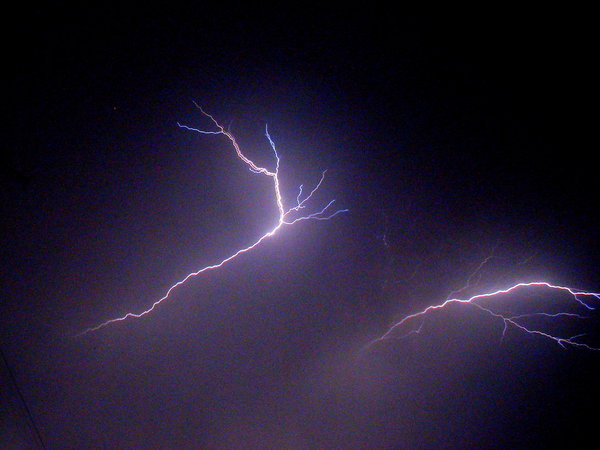This is perhaps the biggest thunderstorm that I haven’t been in. The lightning is flashing and bolting to the ground, and the thunder is booming in every direction—though it is all five miles away. Here there is no wind or rain. The sky is bright directly overhead, but the tall pines on the far side of the field are backdropped in roiled, dark clouds.
Strange. There is a shift in the clouds. They are coming towards us now from the northeast….
I had to run from under the comfortable shelter under the awning of our RV and take some “shelter from the storm” as a huge gust of wind and pelting rain came at us from this strange direction. Just as suddenly, it shifted again and renewed its course to the southwest leaving me perplexed and dampened.
Writers often do the same thing with their writing. They build up a storm of unimagined intensity and create a looming confrontation between the opposing forces whom have been long at battle in their story line. Readers sense the impending conflict that will finally resolve the richly thickened plot; the wind whips, lightning flashes, thunder crashes and…
The storm takes a new direction—blows all hell and fury in another direction—and then returns to its insidious and relentless march to the sea (in New England, all thunderstorms march to the sea!) but the reader is no longer in the path of the storm; they are stranded like a desperate mariner on a now lonely shore watching the clouds boil away over the horizon. The writer, still caught up in his or her storm, assumes the reader is still with them anticipating the coming climax, but they are not. They’re more like me; they are left wondering why the storm took that irrational jog to the southeast, because that is the rational response to mystery—to ask why. There is no reason—aside from perhaps a schoolmasters admonitions—at require us to wade through the muck of tortured writing.
Most of us are rational and surprisingly intuitive, and a good writer needs to recognize and respect that reality. Good readers are like oft jilted lovers wary of another disappointing affair. They know when to put a book aside and find another writer, one who won’t let them down. They love the reward of a well-written story, an inspiring essay, or a compelling narrative; they love writers who consistently provide that reward, and they return to those writers over and again with their time, attention, and money.
A good writer is not in love with his or her own writing. They are in love with the process of writing well, regardless and because of their chosen genre! I will read and re-read Patrick O’Brien’s endless repertoire of naval sea novels, not because O’Brien’s novels are masterpieces of literature, but because he consistently provides a rewarding reading experience for “me” as someone who loves stories of naval battles! O’Brien found his niche, and he found his audience. It is an audience that he respected and worked tirelessly to please before passing away (sadly for his devoted audience eager for more novels) at a ripe old age. Though O’Brien will never be placed among the pantheon of “great” writers, what he aspired to do, he did well, and certainly well enough for me.
Thoreau once said, “Measure a man, not by what he is, but by what he aspires to be.” My readers are, by and large, writers who aspire to be better writers. In the greater scheme of things, I can only give you bits and pieces out of my own insights, experiences, and aspirations. I am only the proverbial finger pointing at the moon.
You will only reach the moon through your own labors.
~John Fitz

Recent Comments